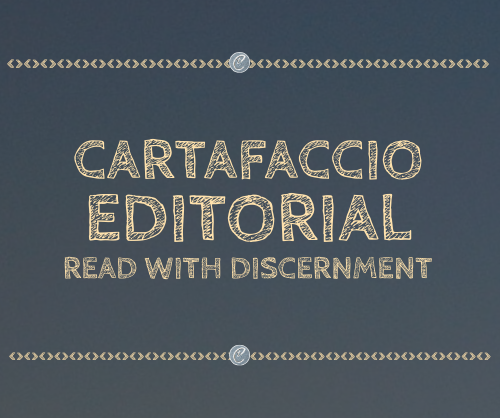Read,
but with discernment
The original article was written in Italian: Leggere sì, ma con giudizio.
English translation by L. Whitaker.
Reading is one of the
healthiest habits a person can have. We get into the habit at an early age,
thanks to our school studies, but it’s important to make an effort to maintain a good reading tradition into adulthood as well.
For many adults, all
the reading they do is limited to a few pages of a newspaper or magazine, or
perhaps the odd instruction manual. Even though this still counts as reading,
it’s not the kind that nourishes our mind, our soul, and even our physical well-being.
We need something different, something ‘more’.
In today’s world,
reading has shifted away from traditional physical books and towards
technological alternatives, such as personal computers, eBook readers or
smartphone. More and more, reading is becoming a digital activity.
This in itself isn’t a problem. The real issue -
related, in many respects, to the rise in consumption of digital content - is
the silent invasion of texts written by Artificial Intelligence.
AI:
the sneaky invader
Let’s pause for a
moment to reflect on a topic that has been on all of our minds recently. It
seems that every media outlet, whether traditional or digital, is completely
obsessed with one single issue: the applications of Artificial Intelligence.
In particular, we’ve
been hearing a lot about the ability of the most popular AI services to create
texts which their creators claim are completely original, on the basis of just
a few lines of prompts. The potential applications of these kinds of tools seem
to be limitless.
Some people might try
out the tools themselves and object that the quality of the texts, especially
the more complex ones, leaves much to be desired. The answer to these
objections is that this technology is adaptive. It can ‘learn’ quickly and improve the quality of the writing.
Moreover, in most cases the texts are edited by a human author, who checks for
overall quality and makes any necessary improvements.
According to fans of AI technology, the
resulting texts are (or at least soon will be) indistinguishable from texts
written entirely by human hand. In no time at all, readers will no longer be
able to tell the difference between the prose of a great writer and a text
created by a machine.
The
great deception
All this paints a
decidedly idealised picture: a powerful new tool, capable of creating an
unlimited number of texts, articles and even books, quickly and without the
uncertainties and delays that sometimes affect human writers.
However, the reality
is quite different. It’s unlikely, if not impossible that a text written by
Artificial Intelligence can ever be the same as one written by a human author.
The difference is
where the writing comes from. On the one hand, we have a machine, however
evolved it might be, capable of churning out mass-produced texts completely
devoid of that inspiration, that spark of creativity that characterises every
word written by a human author, endowed with an immortal soul, be it a famous
writer or an anonymous unknown.
Without that ‘spark’, that unique quality that makes every single text distinct from
all others, the words on a page, be it paper or digital, are just that: mere
words. Words lacking something profound: that touch of mystery that makes
reading nourishing for the soul and enriching for the individual, both for the
writer and the reader.
A text written by an
Artificial Intelligence might be perfectly correct in terms of grammar and
syntax, especially if it’s been checked by a human editor. But it will always
have an indelible mark: readers will always be able to tell that the writing is
not a product of human ingenuity, thought, and reflection, but instead of the
codes and algorithms of a machine.
This inevitably makes it a ‘poor’ text: not because of what
it says, but rather because of what it can (or indeed can’t) convey to the
reader. Let’s consider an example to help illustrate this key difference.
From
the library to the kitchen
Let’s imagine that
someone has cooked us a meal. This person isn’t necessarily a chef; just
someone preparing a meal for family or friends. They’ll obviously follow a
recipe, which might be straightforward, or perhaps rather complicated.
Similarly, the end result might be perfect, if the person cooking is
professional chef, or it might have a few flaws, if they’re an amateur cook.
And now let's imagine
a frozen ready meal, like the ones we might find in the frozen section of any
supermarket. These ready meals promise gourmet results within the space of just
a few minutes, with hardly any effort required. The meal is almost completely
ready by the time it comes out of the factory; all we have to do is heat it up
in the oven or on the stove and dinner is served.
What’s the difference
between the two? The flavour? The smell? The most important difference can be
found in their nutritional content. A freshly prepared meal uses carefully
selected natural, healthy ingredients, which are good for us and nourish our bodies.
Pre-cooked frozen
meals are full of preservatives, such as colourants and flavour enhancers.
These things aren’t nutrients that our bodies can use; on the contrary, they
can even be harmful, especially in the long run, if consumed in large
quantities.
In the same way, texts produced by an Artificial
Intelligence provide very little nourishment for our souls and minds. All we
are left with is a stream of words, lacking any deeper meaning.
The
reader and the author
Let’s consider a book
written by a human author. It doesn’t matter whether they’re famous or not. As
we start reading, we quickly realise that the book is much more than just a
series of words strung together. If we think about it, as we read the author’s
words, it’s as if they themselves were sitting in front of us, telling us their
story.
We might be sitting
on the sofa at home, or on a train, or even outside, on a bench in a park, and
right next to us is a great poet like Shakespeare, or a cloistered nun like
Saint Therese of Lisieux, talking to us through their writing.
These authors tell us
stories to be read, reveal truths and prompt us to reflect on the life’s mysteries, in works of fiction and nonfiction, both
great and small; in short, they nourish our soul, one word at a time. And this
is not only because of the artistic value of their work; above all, it’s because
at the very core of their writing is that inspiration, that spark, that
transforms a simple series of sentences into something greater, something
sublime, which has its fulfilment in traditional Catholic books.
In addition to this,
we must also remember that reading is not only good for the soul, but also for
overall health. And that isn’t just something made up by those who love reading:
it’s scientifically proven fact.
Scientific studies
have shown that reading is the best way to improve linguistic, logical and
comprehension skills, and thus combat the unfortunately increasingly common
issue of functional illiteracy, where people know how to read, but don’t
understand the meaning of the words that they’re reading.
Moreover, reading is
one of the best tools we have for keeping our brains young and for reducing
day-to-day stress, allowing us to escape whatever problems we might be dealing
with, thanks to the compelling power of a good book.
And so, reading has many benefits; however, it’s
also important that we learn to read with discernment, and make sure that we
only spend our time on texts that add value to our lives, that make our day
that little bit better.
* * *
COMING SOON
English
Articles & Books
By
Cartafaccio
Stay tuned, there is something
coming soon.
* * *
Feudum Mariae
by Antonio Signorato
SHARE


